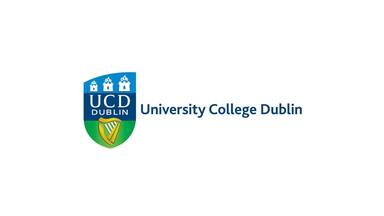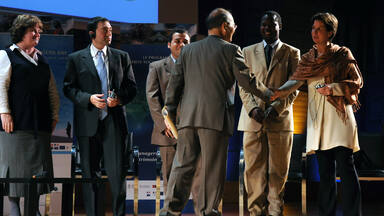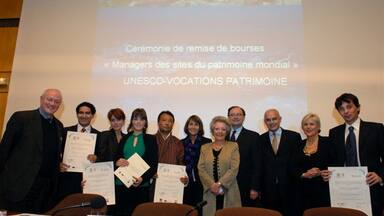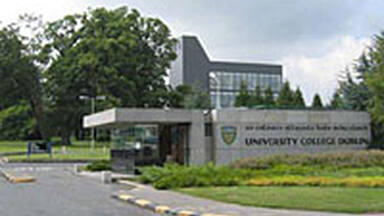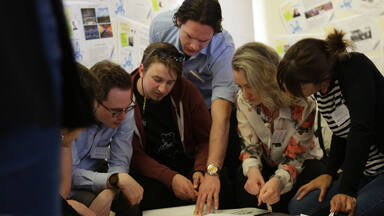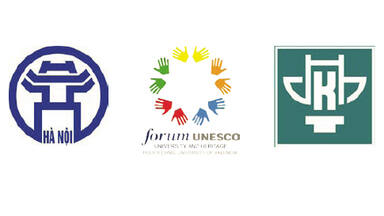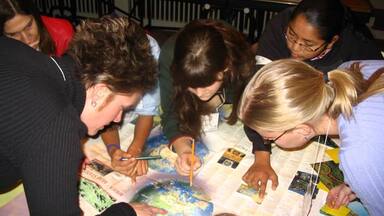Higher education is crucial to the long-term preservation of World Heritage sites. As the World Heritage List grows, there is an urgent need for qualified professionals to manage every aspect of the sites, from conservation and preservation to monitory, to tourism and visitor flows as well as interaction with local authorities and communities.
The World Heritage Centre developed close relationships with universities that are committed to research and education for the protection, conservation and management of cultural and natural heritage through the following initiatives:
UNITWIN / UNESCO Chairs Programme on Heritage
Launched in 1992, the UNITWIN/UNESCO Chairs Programme promotes international inter-university cooperation through twinning and other inking arrangments among higher education academics and institutions throughout the world. The programme aims to enhance institutional capacities through knowledge-sharing, collaborative work and increased faculty and student mobility.
The Programme supports the establishment of UNESCO Chairs and UNITWIN Networks in key priority areas related to UNESCO’s fields of competence, including Heritage.
List of UNESCO Chairs and UNITWIN Networks related to Heritage
Argentina
Australia
- UNESCO Chair in Cultural Heritage and Visualisation, Curtin University, Perth
- UNESCO Chair on International Law and Cultural Heritage, University of Technology Sydney
Austria
Belgium
- UNESCO Chair in Preventive Conservation, Monitoring and Maintenance of Monuments and Sites, The Catholic University of Leuven
Bulgaria
China
- UNESCO Chair on Cultural Management, Southeast University, Nanjing
- UNESCO Chair on Industrial Heritage, Huazhong University of Science and Technology
- UNESCO Chair on Heritage Conservation Planning and Sustainable Social Development, Tsinghua University
- UNESCO Chair on Sustainable Tourism in UNESCO Designated Sites, Sun Yat-Sen University, Guangzhou
Colombia
Costa Rica
- UNESCO Chair on Biosphere Reserves and Natural and Mixed World Heritage Sites, University of San Jose (in Spanish only)
Cuba
- UNESCO Chair in Science and the Conservation of Cultural Property, CENCREM, La Habana (in Spanish only)
Cyprus
Czechia
Egypt
- UNESCO Chair on Cultural Heritage Education (2022), Helwan University (2022)
- UNESCO Chair on Sciences and Technology for Cultural Heritage at Cairo University (2023)
France
- UNESCO Chair in Culture and Traditions of Wine, University of Bourgogne, Dijon
- UNESCO Chair/Network in Earthen Architecture, Constructive Cultures and Sustainable Development, Grenoble
- International Network "Culture Tourism and Development", Universite de Paris I (Pantheon - Sorbonne), Paris
- UNESCO Chair on Rivers and Heritage: Natural and Cultural Diversity of River Landscapes, Université François Rabelais de Tours
- UNESCO Chair of History, Culture, and Intercultural, Catholic University of Lyon
Germany
- UNESCO Chair in Heritage Studies, the Brandenburg Technical University, Cottbus
- UNESCO Chair in World Cultural and Urban Landscapes, Aachen
- UNESCO Chair in World Hertiage and Biosphere Reserve Observation and Education, Heidelberg University of Education
Hungary
- UNESCO Chair in Cultural heritage Management and Sustainability,The Institute for Social and European Studies Foundation, University of Pannonia
- UNESCO Chair in Cultural Policy and Cultural Management, Debrecen
Israel
- UNESCO Chair on the Heritage of the Modern Movement, Tel Aviv Universtiy, Tel Aviv
- UNESCO Chair in Urban Design and Conservation Studies, The Bezalel, Academy of Arts and Design, Jerusalem
Italy
- UNESCO Chair in Architectual Preservation and Planning in Heritage Cities, Politencnico di Milano
- UNESCO Chair on Sustainable Urban Quality and Urban Culture, notably in Africa, University of Rome - La Sapienza
- UNESCO Chair on Heritage and Urban Regeneration, the University IUAV of Venice
- UNESCO Chair on Landscape, Cultural Heritage, and Terrirotial Governance, the Research Centre of Comptence of the Campania Region for Cultural Heritage, Ecology and Economy (BENECON) Caserta
- UNESCO Chair on Mediterranean Cultural Landscapes and Communities of Knowledge, University of Basilicata, Potenza
Japan
- UNESCO Chair on Cultural Heritage and Risk Management, Ritsumeikan University
- UNESCO Chair on Nature-Culture Linkages in Heritage Conservation, University of Tsukuba
Jordan
Republic of Korea
Mexico
- UNESCO Chair in Conservation of Cultural Properties Sciences, Mexico's National School of Conservation, Restoration and Museology
Morocco
Norway
Oman
Pakistan
- UNESCO Chair in the Conservation and Management of Historic Towns and Urban Centers, the National College of Arts, Lahore
Palestine
Peru
- UNESCO chair on Cultural Heritage and Sustainable Tourism, University of San Martin de Porres, Lima
Poland
- UNESCO Chair for Heritage and Urban Studies, Cracow University of Economics
- UNESCO Chair on Cultural Property Law, University of Opole
Portugal
- UNESCO Chair Humanities and Cultural Integrated Landscape Management, Instituto Politecnico de Tomar
- UNESCO Chair on Intercultural Dialogue on Heritages of Portugese Influence, University of Coimbra
- UNESCO Chair on Biodiversity Safeguard for Sustainable Development, University of Coimbra
- UNESCO Chair on Heritage, Cities and Landscapes. Sustainable Management, Conservation, Planning and Design, University of Porto
Russian Federation
- UNESCO Chair in Urban and Architectural Conservation, Moscow
- UNESCO Chair for Wooden Architecture, Research and Preservation, Petrozavodsk State University and Kizhi Open Air Museum, Petrozavodsk
Singapore
Spain
- UNESCO Chair in Industrial and Mining Heritage, Universite Polytechnique de Madrid, Madrid
- UNESCO Chair on Forum University and Heritage, Universitat Politecnica de Valencia
- UNESCO Chair on Cultural Landscapes and Heritage, University of Basque Country. UPV/EHU
- UNESCO Chair in Tourism Planning and Sustainable Development, Las Palmas
Sweden
Switzerland
- UNESCO Chair on ICT to Develop and Promote Sustainable Tourism at World Heritage Sites, Universita della Svizzera Italiana, Lugano
- UNESCO Chair on Natural and Cultural Heritage for Sustainable Mountain Development, University of Berne
Turkey
United Kingdom of Great Britain and Northern Ireland
- UNESCO Chair on Archaeological Ethics and Practices in Cultural Heritage, Durham University
- UNESCO Chair on Cultural Property Protection and Peace, University of Newcastle upon Tyne
**More information on the UNESCO Chairs/UNITWIN Networks under the UNESCO Culture Sector is available at: http://en.unesco.org/partnerships/culture/unitwin/unesco-chairs-programme-in-culture
Forum UNESCO - University and Heritage International Network
Created by UNESCO in 1995, the network of Forum UNESCO - University and Heritage is a programme in favour of cultural and natural heritage conservation. It is placed under the common responsibility of World Heritage Centre of UNESCO and the Polytechnic University of Valencia (UPV, Spain) (Click here for the leaflet).
As one of the success stories of cooperation through the UNESCO Chairs Programme, today it mobilises a wide informal network of higher education institutions and professionals, to undertake activities for enhancing the protection of the cultural and natural heritage.
There are two ways to become affiliated to this network: individually or institutionally.
Individual affiliation (Spanish version , French Version) to this network is free and simple. Academic staff, researchers, heritage professionals and students (above Masters level) may join the network on an individual basis. Individual members receive the FUUH monthly electronic newsletter informing them about worldwide news on natural and /or cultural activities. As an interactive communication tool, they are invited to send news about their respective activities, provided that they relate to heritage. These news are reflected in the next FUUH newsletter, thus providing members instant worldwide dissemination and visibility.
Institutional affiliation is made through the signature of a Memorandum of Understanding (MoU) in which the World Heritage Centre of UNESCO and a University agree to work together in a spirit of cooperation to reinforce links between their institutions, and contribute to World Heritage research and knowledge .
This is accomplished through activities such as :
- joint or team research projects
- student or academic staff exchanges
- consultancy services
- organisation of meetings
- sharing documentation and information.
Universities interested in working with the World Heritage Centre of UNESCO through signing a Memorandum of Understanding can contact the World Heritage Centre.
World Heritage Studies Programmes at Universities
Many universities worldwide offer coursework related to heritage studies, and a few programmes are specialised in World Heritage issues, including those listed below. This list is not exhaustive, and the World Heritage Centre does not recommend one over another. You can click on the link to visit the university's website; please contact the university directly for more information. Other programmes will be added here as they are established.
- Brandenburg University of Technology (BTU), Cottbus, Germany - Interdisciplinary PhD programme
- Deakin University, Melbourne, Australia - Master Degree in Cultural Heritage and Museum Studies
- Turin School of Development, Italy - Master in World Heritage and Cultural Projects for Development
- Universita' Degli Studi Di Torino - International Master in Cultural Property Protection in Crisis Response
- UCL Institute of Archaeology, United Kingdom of Great Britain and Northern Ireland - MA in Cultural Heritage Studies
- University College Dublin (UCD), Ireland - World Heritage Management MSc
- University of Queensland, Master of Environmental Management (MEnvMan), Australia
- University of Tsukuba, Japan - World Heritage Studies
- Wildlife Institute of India - Master in Heritage Conservation and Management
- University of Eastern Finland (UEF) and the United Nations Environment Programme - Programme Course on Multilateral Environmental Agreements

